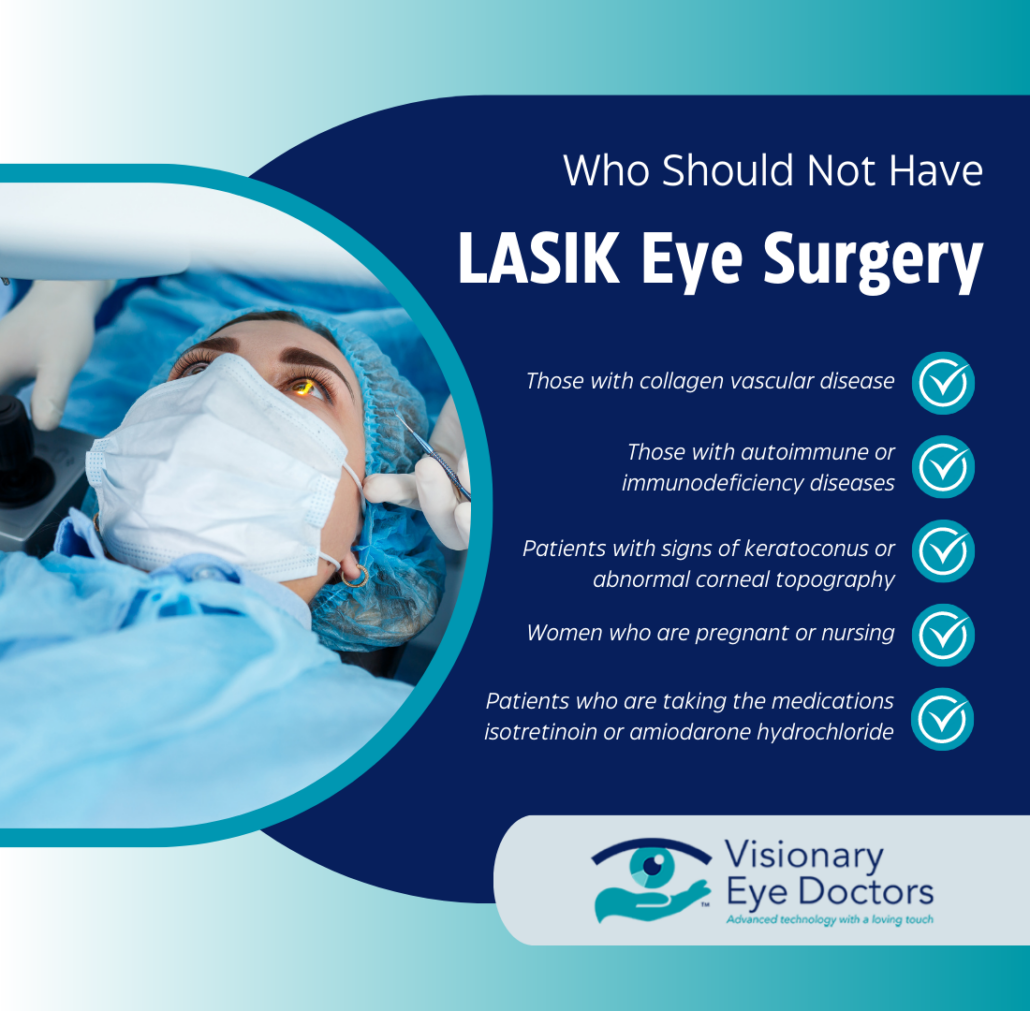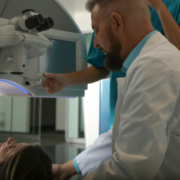Risks of LASIK Eye Surgery: An Informed Perspective
In recent years, the appeal of seeing the world without the aid of glasses or contact lenses has grown exponentially. One method, LASIK eye surgery, has emerged as a leading solution for many eager to correct their vision problems. For countless individuals, the dream of waking up with perfect vision is no longer a far-off fantasy but a reality within reach, thanks to LASIK.
But like any surgical procedure, potential candidates for LASIK surgery must be aware not just of its benefits but also its risks. It’s a decision that can change your life, and while many have experienced the positive, life-altering results of LASIK, it’s crucial to approach this decision with a full understanding of the potential risks and side effects.
At Visionary Eye Doctors, we understand this concern and are happy to guide our patients through both the pros and cons of all our procedures to help them feel as comfortable as possible. In this blog, we’ll review the complications associated with LASIK and how to tell if it is right for you.
Understanding LASIK
Before diving into the potential risks associated with LASIK, it’s essential to have a clear understanding of the procedure itself and the technology involved.
LASIK has become a commonly performed procedure since it was approved by the Food and Drug Administration in 1999. LASIK, which stands for Laser-Assisted In Situ Keratomileusis, is a type of refractive surgery designed to correct vision problems such as myopia (nearsightedness), hyperopia (farsightedness), and astigmatism. The procedure primarily involves reshaping the cornea, which is the clear front part of the eye, to allow light entering the eye to be properly focused onto the retina for clearer vision.
This refractive procedure typically starts with the creation of a thin corneal flap. This is achieved using a femtosecond laser. Once the flap is created, it’s gently lifted to expose the underlying corneal tissue. An excimer laser is then used to delicately reshape the cornea. After the desired reshaping is achieved, the corneal flap is repositioned, which naturally adheres without the need for stitches.
You might wonder, “How does LASIK differ from other vision correction procedures?” One common alternative to LASIK is photorefractive keratectomy (PRK). While both involve reshaping the cornea with an excimer laser, PRK doesn’t involve creating a corneal flap. Instead, the outer layer of the cornea is removed, and the reshaping occurs on the surface.
The procedure takes just a few minutes, but its results can have a tremendous impact on the quality of life for those suffering from nearsightedness, farsightedness, and astigmatism.
Accuracy, precision, and expertise are paramount when it comes to LASIK. The technology behind it is groundbreaking, but it’s the surgeon’s skill that plays a significant role in ensuring a successful outcome and minimizing potential complications. For this reason, picking the doctor is extremely important in reducing this surgery’s risks.
That said, LASIK is not for everyone. Every surgical procedure, even one as common as LASIK, has its risks. Although most patients are pleased with the results of their laser vision correction surgery, it’s important to weigh the chance of experiencing complications against the benefits of the procedure.
Potential Complications
Every medical procedure, from the simplest to the most complex, comes with its own set of potential risks and complications. LASIK, despite its widespread success and technological advancements, is no exception.
Many of the risks you hear about in connection with LASIK are just temporary side effects that often resolve themselves within a few months of the procedure. This can include visual symptoms like mild to severe dry eye, halos, glare, starbursts, and double vision. These are common while your eyes fully heal, and your surgeon should be able to ease the symptoms with eye drops.
Other, sometimes more serious potential complications, can occur. These can include:
Dry Eye
One of the most common side effects post-LASIK is dry eye. The procedure can temporarily decrease tear production, causing discomfort and even double vision in some cases. While artificial tears and medications can alleviate these symptoms, for some, this condition might persist.
Vision Issues
In certain scenarios, LASIK might result in under-corrections or over-corrections. This means that the desired visual acuity isn’t achieved in one go, necessitating additional procedures. There’s also a chance of experiencing glare, halos, or starbursts in low-light conditions, especially during nighttime.
Flap Complications
The creation of the corneal flap is a crucial step in the LASIK procedure. If issues arise with the LASIK flap, such as it not adhering properly or being infected, it can lead to additional complications. One such example is Keratitis which is the inflammation of the cornea.
Refractive Errors
Post-operative refractive errors, like astigmatism, can be introduced or may not be fully corrected during the LASIK procedure, resulting in blurry vision. Sometimes, corrective lenses may still be required after the surgery.
Rare but Serious LASIK Complications
Rare cases like retinal detachment, corneal epithelium issues, and even vision loss can occur. Such serious complications emphasize the importance of thorough consultations and choosing skilled surgeons.
Drawing from statistics and draft guidance provided by the drug administration, it’s important to note that a significant majority of LASIK patients experience successful outcomes with minimal complications. The keyword here is ‘majority’. While the procedure has a high success rate, individual experiences vary.

Who Should Not Have LASIK?
Your risk factor for these serious complications dramatically increases if you are not a strong candidate for the LASIK procedure in the first place, so it’s important to review your health history with your surgeon ahead of time.
The following patients should not have LASIK:
Those with collagen vascular disease
Those with autoimmune or immunodeficiency diseases
Patients with signs of keratoconus or abnormal corneal topography
Women who are pregnant or nursing
Patients who are taking the medications isotretinoin (Accutane™) or amiodarone hydrochloride (Cordarone™)
If your consultation reveals that you are not a good candidate, there are several LASIK alternatives that could be a better fit. This includes photorefractive keratectomy, clear lens exchange, and implantable contact lenses. Visionary Eye Doctors has experts in all these areas and will evaluate you to determine the right path for your optimal vision.
Know Your Risk Beforehand
The most critical way to optimize your LASIK results is by choosing the right doctor. Always choose a board-certified LASIK surgeon, and set up an initial consultation to determine your candidacy and the potential for complications.
The experts at Visionary Eye Doctors take this step seriously and conduct a thorough diagnostic eye exam that evaluates:
- The shape and thickness of your cornea
- Your refractive errors and pupil size
- The moistness of your eyes (to check for dry eye syndrome)
- Your general health and medical history
- Any medications you are taking
Understanding the risks of LASIK eye surgery underscores the paramount importance of choosing the right professionals to handle such a life-changing procedure. For residents of the DC and Maryland metropolitan area, Visionary Eye Doctors has emerged as the leading provider of reliable eye care.
Feel Confident With Visionary Eye Doctors
Your safety is our top concern at Visionary Eye Doctors. We take every precaution possible to protect your vision while helping you regain your quality of life.
 Count on our board-certified LASIK experts to:
Count on our board-certified LASIK experts to:
- Evaluate your eye health
- Explain your treatment options
- Answer any questions
- Provide expert follow-up care
For many, the LASIK procedure starts a new chapter—a life free from the constraints of glasses or contact lenses. Whether it’s the simple joy of participating in normal activities with clear vision or the freedom to partake in new adventures, the potential benefits are transformative.
The decision to pursue LASIK eye surgery is deeply personal. It weighs in the desire for clear vision with the reality of potential risks. But with the right information and the trusted partnership of a dedicated team like Visionary Eye Doctors, the journey can be one of clarity, confidence, and transformation.
Choosing a skilled and experienced LASIK eye surgeon can reduce risk and enable you to achieve the best possible results from laser eye surgery. To schedule a consultation with our refractive surgeon and discuss if LASIK is right for you, contact Visionary Eye Doctors at (301) 591-1763.

